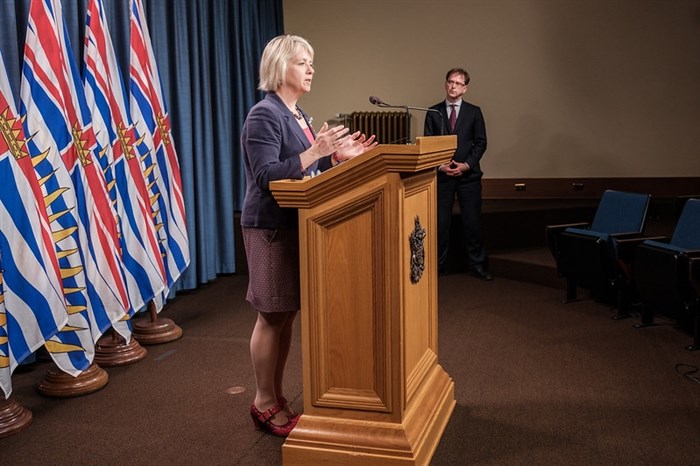
B.C. Health Minister Adrian Dix looks on as provincial health officer Dr. Bonnie Henry provides an update on COVID-19 on July 6, 2020.
Image Credit: SUBMITTED / Province of B.C.
April 12, 2021 - 5:15 PM
The current slate of vaccines all work well against the varying strains of COVID-19 circulating through B.C., the province’s top doctor said today.
At the start of another week with bleak-sounding case counts, further controls on businesses that have outbreaks and emotional pleas to stop socializing outside the bubble, that was one bright spot.
Dr. Bonnie Henry said during a media briefing today, April 12, vaccine efficacy against new strains of the disease is something health officials have been looking at carefully and they’ve found cause for some positivity.
“We have been doing whole genome sequencing, making sure we understand if there's been an impact,” Dr. Henry said. “So far we are seeing that all of the vaccines that we have are working well against the viruses that we are seeing circulating in B.C. right now, that includes all of the variants of concern, so that is good news. Obviously we will continue to watch that carefully, and that's the focus of our whole genome sequencing program.”
That said, the vaccine isn’t rolling out as fast in Canada as, for example, the US.
READ MORE: 299 cases of COVID-19 in Interior Health since Friday, 3,289 in B.C.
“To date, we've delivered over 1,112,101 doses of all three COVID-19 vaccines across British Columbia,” she said. “Of those 87,744 are second doses.”
She said that the Pfizer vaccine is the workhorse of the age-based vaccination program, and despite some shipment issues early on in the vaccination process there’s been some steadiness to the supply.
“The shipments of Pfizer that we are expecting to receive over the next few weeks, the peak was last week, this week and next week and then we have smaller numbers,” she said.
“But we also know that we have Moderna coming, and it comes in various ways. We also know that there's a whole lot more vaccine that's on order, and we don't yet have the understanding of what May is going to look like in detail.”
That points to one of the challenges they’ve had with this program across the country.
“It’s a product of the fact that we're getting vaccines from other countries,” she said.
The program is being used right now to address both people by age, which she said is the highest risk, but also hotspots and outbreaks where transmission in the community can be prevented.
AstraZeneca is being used concurrently for people who are 55 and over.
“It is a balancing and yes, it makes us all anxious, particularly on Monday afternoons, if Pfizer doesn't come in as scheduled,” she said. “Then we just need to postpone clinics, but we need to get vaccine into people's arms as quickly as we can across the province.”
In the meantime, case numbers continue to mount and this weekend was a big one.
From Friday to Saturday there were 1,283 new cases of COVID-19 diagnosed, from Saturday to Sunday there were an additional 1,036 and in the last 24 hours another 970 new cases.
While measures to close businesses for 10 days after exposures have been recorded were implemented today, some have asked Dr. Henry why there hasn’t been more effort to shut down the province and avert a situation as is being seen in Ontario, where case numbers have ramped up to near unmanageable numbers.
“We have ongoing daily conversations with the key leadership team around our schools around the province (and) we look at what are the measures that need to be in place, and we look at what are the options on a school and a school district basis,” she said, adding that superintendents, principals and teachers are part of the conversation.
“One of the things that we know is that there are hotspots in the province, where there have been increased exposure events related to transmission in the community and that's why we prioritize school staff in the Surrey School District for example, who have all been offered immunization.”
She said health officials are also looking at other hotspot areas around the province.
“These are things that are looked at on an ongoing basis, but I will say that when we see increased transmission in the community, it's when children were not in school,” she said.
“The important structure that school gives to families and communities is really important, and it's a less risky environment. Those are things that we need to pay attention to too.”
She said she also “heard loud and clear” from families and educators across B.C. last year when the schools shutdown that it had a negative impact.
“We need to pay attention to that too and it is finding that balance of keeping things operating safely and making sure that we are supporting children as best we can, through what is really a challenging time,” she said.
“Challenging, I know people don't like that word, I don't know what the word is but this is a really difficult time, and the best thing that we can do for this generation of children is to support their learning and their emotional, physical growth in school.”
To contact a reporter for this story, email Kathy Michaels or call 250-718-0428 or email the editor. You can also submit photos, videos or news tips to the newsroom and be entered to win a monthly prize draw.
We welcome your comments and opinions on our stories but play nice. We won't censor or delete comments unless they contain off-topic statements or links, unnecessary vulgarity, false facts, spam or obviously fake profiles. If you have any concerns about what you see in comments, email the editor in the link above.
News from © iNFOnews, 2021